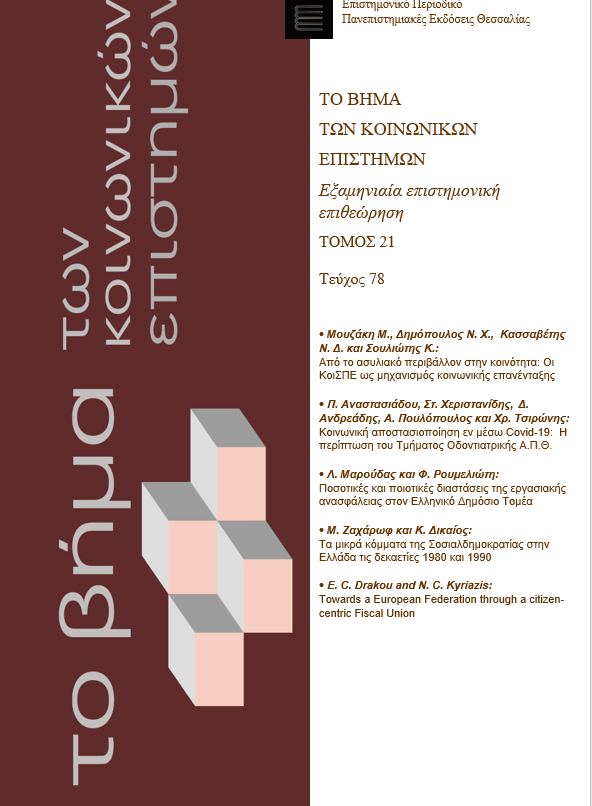Από το ασυλιακό περιβάλλον στην κοινότητα: Οι ΚοιΣΠΕ ως μηχανισμός κοινωνικής επανένταξης
DOI:
https://doi.org/10.26253/heal.uth.ojs.sst.2023.1980Λέξεις-κλειδιά:
ψυχική ασθένεια, κοινωνικός αποκλεισμός, άσυλο, κοινωνική επανένταξηΠερίληψη
Η διαχείριση της ψυχικής ασθένειας ακολουθεί τις εκάστοτε κυριαρχούσες κοινωνικές αντιλήψεις, με αποτέλεσμα να διαπιστώνονται σημαντικές διαφοροποιήσεις στην έννοια, όπως και στο πρότυπο του ψυχικά ασθενούς. Κατά τη διάρκεια των αιώνων η ψυχική ασθένεια γίνεται συνώνυμο της επικινδυνότητας και της επιθετικότητας, «απειλώντας» την κοινωνική συνοχή της κοινότητας. Ο μοναδικός τρόπος διαχείρισης αυτής της απειλής ήταν ο περιορισμός της εντός του οικογενειακού και του ασυλιακού περιβάλλοντος, υπό το φόβο του στίγματος της ίδιας της οικογένειας. Μία αντίδραση που σχετίζεται άμεσα με το στίγμα που συνοδεύει την ψυχική ασθένεια και ευθύνεται για τα φαινόμενα αποκλεισμού και πολλαπλών διακρίσεων που αντιμετωπίζουν. Με την εφαρμογή της ψυχιατρικής μεταρρύθμισης στη χώρα, η φροντίδα των ψυχικά ασθενών μεταφέρεται στην κοινότητα, στοχεύοντας στον αποϊδρυματισμό και στην κοινωνική τους επανένταξη, περιορίζοντας παράλληλα το στίγμα της ψυχικής ασθένειας. Σε αυτή τη διαδικασία ο ρόλος των κοινωνικών συνεταιρισμών (ΚοιΣΠΕ) είναι καθοριστικός, διότι προωθούν της ψυχοκοινωνική αποκατάσταση μέσω της παροχής απασχόλησης σε άτομα με σοβαρά προβλήματα ψυχικής υγείας.

